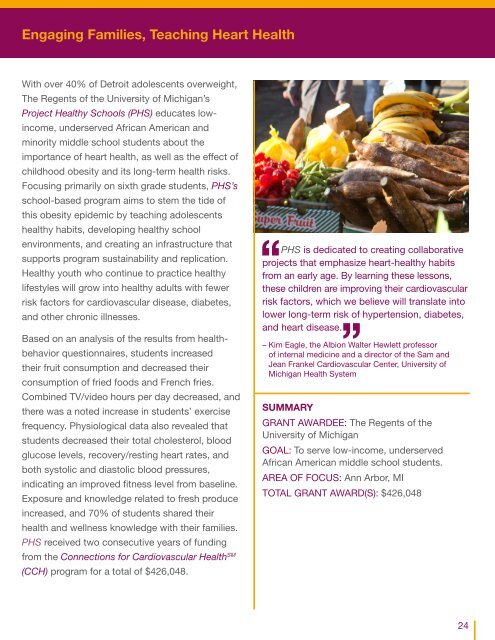Satellite?blobcol=urldata&blobheader=application/pdf&blobheadername1=Content-Disposition&blobheadername2=MDT-Type&blobheadervalue1=inline;+filename=2012-AstraZeneca-HealthCare-Foundation-Annual-Report
Satellite?blobcol=urldata&blobheader=application/pdf&blobheadername1=Content-Disposition&blobheadername2=MDT-Type&blobheadervalue1=inline;+filename=2012-AstraZeneca-HealthCare-Foundation-Annual-Report
Satellite?blobcol=urldata&blobheader=application/pdf&blobheadername1=Content-Disposition&blobheadername2=MDT-Type&blobheadervalue1=inline;+filename=2012-AstraZeneca-HealthCare-Foundation-Annual-Report
You also want an ePaper? Increase the reach of your titles
YUMPU automatically turns print PDFs into web optimized ePapers that Google loves.
Engaging Families, Teaching Heart Health<br />
With over 40% of Detroit adolescents overweight,<br />
The Regents of the University of Michigan’s<br />
Project Healthy Schools (PHS) educates lowincome,<br />
underserved African American and<br />
minority middle school students about the<br />
importance of heart health, as well as the effect of<br />
childhood obesity and its long-term health risks.<br />
Focusing primarily on sixth grade students, PHS’s<br />
school-based program aims to stem the tide of<br />
this obesity epidemic by teaching adolescents<br />
healthy habits, developing healthy school<br />
environments, and creating an infrastructure that<br />
supports program sustainability and replication.<br />
Healthy youth who continue to practice healthy<br />
lifestyles will grow into healthy adults with fewer<br />
risk factors for cardiovascular disease, diabetes,<br />
and other chronic illnesses.<br />
Based on an analysis of the results from healthbehavior<br />
questionnaires, students increased<br />
their fruit consumption and decreased their<br />
consumption of fried foods and French fries.<br />
Combined TV/video hours per day decreased, and<br />
there was a noted increase in students’ exercise<br />
frequency. Physiological data also revealed that<br />
students decreased their total cholesterol, blood<br />
glucose levels, recovery/resting heart rates, and<br />
both systolic and diastolic blood pressures,<br />
indicating an improved fitness level from baseline.<br />
Exposure and knowledge related to fresh produce<br />
increased, and 70% of students shared their<br />
health and wellness knowledge with their families.<br />
PHS received two consecutive years of funding<br />
from the Connections for Cardiovascular Health SM<br />
(CCH) program for a total of $426,048.<br />
PHS is dedicated to creating collaborative<br />
projects that emphasize heart-healthy habits<br />
from an early age. By learning these lessons,<br />
these children are improving their cardiovascular<br />
risk factors, which we believe will translate into<br />
lower long-term risk of hypertension, diabetes,<br />
and heart disease.<br />
– Kim Eagle, the Albion Walter Hewlett professor<br />
of internal medicine and a director of the Sam and<br />
Jean Frankel Cardiovascular Center, University of<br />
Michigan Health System<br />
SUMMARY<br />
GRANT AWARDEE: The Regents of the<br />
University of Michigan<br />
GOAL: To serve low-income, underserved<br />
African American middle school students.<br />
AREA OF FOCUS: Ann Arbor, MI<br />
TOTAL GRANT AWARD(S): $426,048<br />
24


